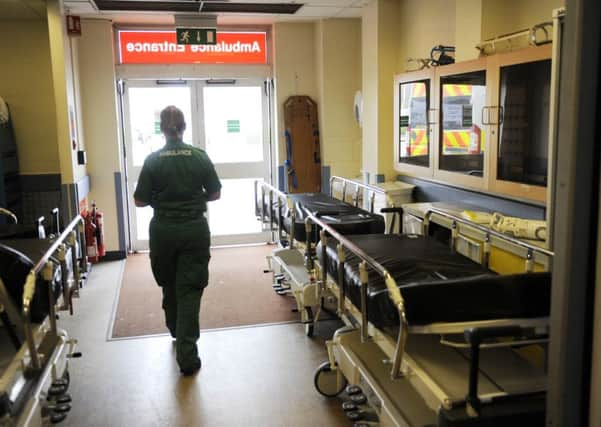Doctors warn that target-driven blame culture in NHS Scotland must end


In a frank and open message, Peter Bennie, the chairman of the British Medical Association’s Scottish Council, has attacked the Scottish Government and said the pressure put on the healthcare workforce to achieve targets was “simply not sustainable”.
Dr Bennie’s comments echo the sentiments of the former chief medical officer Sir Harry Burns, who said much the same thing when releasing the findings from his review into targets and indicators last month. The warning also comes on the back of a drop in the performance of Scotland’s accident and emergency departments amid a surge in demand over the festive period.
Advertisement
Hide AdAdvertisement
Hide AdDr Bennie called for a “fundamental shift” in the use of data in the health service so that staff are better able to use their skills and judgment. Professor Burns has previously spoken about looking at the “whole journey of care” as opposed to separate targets.
Dr Bennie said: “Firstly, I want to pay tribute to and thank all the doctors working hard at this time of year to deliver a first class service for patients across Scotland.
“But the pressures they are facing are not unique to Christmas. Against a background of insufficient funding, increasing vacancies and rising demand, the expectation put on hard-pressed doctors and the whole healthcare workforce to meet the various targets currently in place is simply not sustainable.
“Multiple targets, an ageing population and the funding gap are creating a vicious circle, stretching the system and the workforce beyond their means.”
He added: “The current culture of using crude measures, often taken in isolation, to judge the complexities of the whole healthcare system, and to apportion blame, must end.
“I believe that there will always be a need to set standards for patient care, and for these to be monitored. Indeed, proper use of these figures can provide indications of where improvements in funding or service design are needed, and where the system is under most pressure. However, saying that a patient moved out of A&E, perhaps to an inappropriate ward, simply to meet the four-hour target is somehow a success, when it may well have been better for the patient to stay in the emergency department, indicates the faults with the current over-reliance on targets and the pressure they place on healthcare staff.”
Dr Bennie said that the BMA was happy to work with the Scottish Government to deliver a more “mature” way of dealing with health service data that would place greater emphasis on doing the right thing for patients.
Health secretary Shona Robison said: “We agree with the BMA that there should be a balanced approach to monitoring and improving the quality of the health and social care system. Targets and indicators form part of this balanced approach and have an important role in giving people clarity on what to expect from health and social care services, and in monitoring performance across the country. But they can never be an end in themselves.
Advertisement
Hide AdAdvertisement
Hide Ad“Professor Sir Harry Burns’ comprehensive review and findings published last month enable us to start the process of devising new methods to more deeply understand people’s experience whilst using health and social care services. Our ambition must be to not only improve the care of individuals needing treatment, but to utilise the information from improved systems to enhance the health of Scotland as a whole.”
Welcoming Dr Bennie’s comments, shadow health secretary Miles Briggs MSP said: “I know from speaking with many frontline NHS staff that we clearly need to change the target culture in our NHS and we want to see a shift in our health services towards an outcomes based approach.”